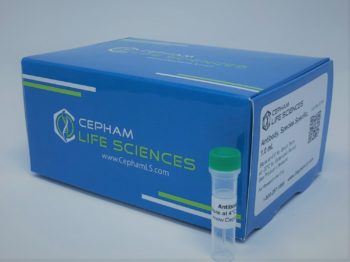Description
Aliases
CARD-containing IL-1 beta ICE-kinase; CARD-containing interleukin-1 beta converting enzyme associated kinase; CARDIAK; EC 2.7.11.1; kinase RIPK2; Receptor-interacting protein 2; Receptor-interacting serine/threonine protein kinase 2; RICK; RIP-2; RIP-like
Antibody Type
Polyclonal Antibody
Uniprot ID
Swiss-Prot#:O43353;
NCBI Gene#:8767
Immunogen
Peptide sequence around phosphorylation site of serine 176 (S-L-S(p)-Q-S) derived from Human RIPK2.
Raised In
Rabbit
Species Reactivity
Human Mouse
Tested Applications
WB IHC Recommended dilution: Western blotting: 1:500~1:3000, Immunohistochemistry: 1:50~1:100,
Background / Function
Serine/threonine/tyrosine kinase that plays an essential role in modulation of innate and adaptive immune responses. Upon stimulation by bacterial peptidoglycans, NOD1 and NOD2 are activated, oligomerize and recruit RIPK2 through CARD-CARD domains. Contributes to the tyrosine phosphorylation of the guanine exchange factor ARHGEF2 through Src tyrosine kinase leading to NF-kappaB activation by NOD2. Once recruited, RIPK2 autophosphorylates and undergoes ‘Lys-63’-linked polyubiquitination by E3 ubiquitin ligases XIAP, BIRC2 and BIRC3. The polyubiquitinated protein mediates the recruitment of MAP3K7/TAK1 to IKBKG/NEMO and induces ‘Lys-63’-linked polyubiquitination of IKBKG/NEMO and subsequent activation of IKBKB/IKKB. In turn, NF-kappa-B is released from NF-kappa-B inhibitors and translocates into the nucleus where it activates the transcription of hundreds of genes involved in immune response, growth control, or protection against apoptosis. Plays also a role during engagement of the T-cell receptor (TCR) in promoting BCL10 phosphorylation and subsequent NF-kappa-B activation.
Conjugate
Unconjugated
Storage Buffer
Rabbit IgG in phosphate buffered saline (without Mg2+ and Ca2+), pH 7.4, 150mM NaCl, 0.02% sodium azide and 50% glycerol.
Form
liquid
Storage
Shipped at 4°C. Upon delivery aliquot and store at -20°C or -80°C. Avoid repeated freeze.
Purity
Antibodies were produced by immunizing rabbits with synthetic phosphopeptide and KLH conjugates. Antibodies were purified by affinity-chromatography using epitope-specific phosphopeptide. Non-phospho specific antibodies were removed by chromatogramphy using non-phosphopeptide.
Modification
Phospho-Ser176
Additional information
| Size | 100?l |
|---|


